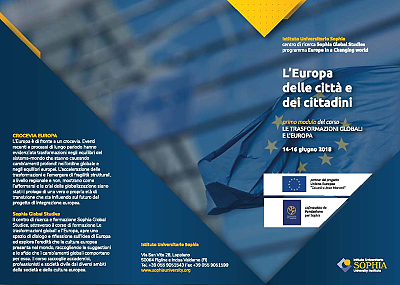
May 25, 2018 | Non categorizzato
 Next June, the Sophia University Institute will inaugurate the first module of the course “Europe and the global transformations.” The 18-hour course, conducted by Léonce Bekemans, Jean Monnet Chair Ad Personam of “Globalization, Europeanisation and Human Development,” proposes the study of the role of cities as workshops of integration and citizens as the foremost actors in the process of the European project relaunch. The lessons will present the state of the integration process, reflecting on concepts such as independence, inclusion and European citizenship. Particular focus will be set on the revolt against governance systems and their local and regional dimensions. The course will be opened with an introductory paper of Romano Prodi entitled: “Europe today. What Europe in the future? The course module addresses professionals, primary and secondary school teachers, scholars, administrators and communication operators. Professors and school directors may make use of the Teacher’s Card (MIUR 170/2016). 15 scholarships are at the disposal of young people up to 30 years of age. For information and registration www.sophiauniversity.org, globalstudies@iu-sophia.org.
Next June, the Sophia University Institute will inaugurate the first module of the course “Europe and the global transformations.” The 18-hour course, conducted by Léonce Bekemans, Jean Monnet Chair Ad Personam of “Globalization, Europeanisation and Human Development,” proposes the study of the role of cities as workshops of integration and citizens as the foremost actors in the process of the European project relaunch. The lessons will present the state of the integration process, reflecting on concepts such as independence, inclusion and European citizenship. Particular focus will be set on the revolt against governance systems and their local and regional dimensions. The course will be opened with an introductory paper of Romano Prodi entitled: “Europe today. What Europe in the future? The course module addresses professionals, primary and secondary school teachers, scholars, administrators and communication operators. Professors and school directors may make use of the Teacher’s Card (MIUR 170/2016). 15 scholarships are at the disposal of young people up to 30 years of age. For information and registration www.sophiauniversity.org, globalstudies@iu-sophia.org.
May 24, 2018 | Non categorizzato
https://vimeo.com/271706391 (2403M) Copyright 2018 © CSC – P.A.F.O.M. – All rights reserved
“Two weeks ago we were with the Pope in Loppiano. Two weeks have gone by and we ask ourselves, “Did it really happen?” It really did! It did not only happen, but now we have something to do. So at the moment I am asking myself, “Have we fully understood what actually happened?” Maybe we are discovering it a little at a time, as we understand his wonderful talk better, because the Pope challenged us. He said we are at the beginning of our journey, at the start of Loppiano, at the start of everything, we might say. This being at the start means that we must look ahead, that we must do something to move forward. And the Pope told us what to do: we must transform society – he said some very strong things – we must not content ourselves with fostering relationships between individuals, in families, between different groups and peoples, but we must even get together to beat the challenge of this society which is going wrong and needs the Gospel, which is in extreme need of seeds of Gospel life that then grow and transform it. We really feel we are at the start, and we truly are at the start, but we cannot stop, precisely because in saying this the Pope gave us this challenge and said, “You can do it”. He also told us how to do it, because he said, “… by handing on to others the spirituality of ‘we’, this ‘culture of we’”, which can foster a global alliance, a universal alliance, a new civilisation, a civilisation born from this ‘we’. He also said that the charism is a powerful help and encouragement for us. The charism is a gift of God, so we mustn’t feel proud about having received this charism, but with the humility he reminded us about, we must be aware of the charism and do all we can to hand it on to society around us. This is a long and tough path, but the Pope said, “We need women and men who are fit for this”. So, do we want to respond to the Pope’s appeal? I think we do, and that we will give the whole of ourselves as we discover, there where we are, how to transform society around us. I think this is the commitment we are taking up today and that will last our whole lives.”

May 24, 2018 | Non categorizzato
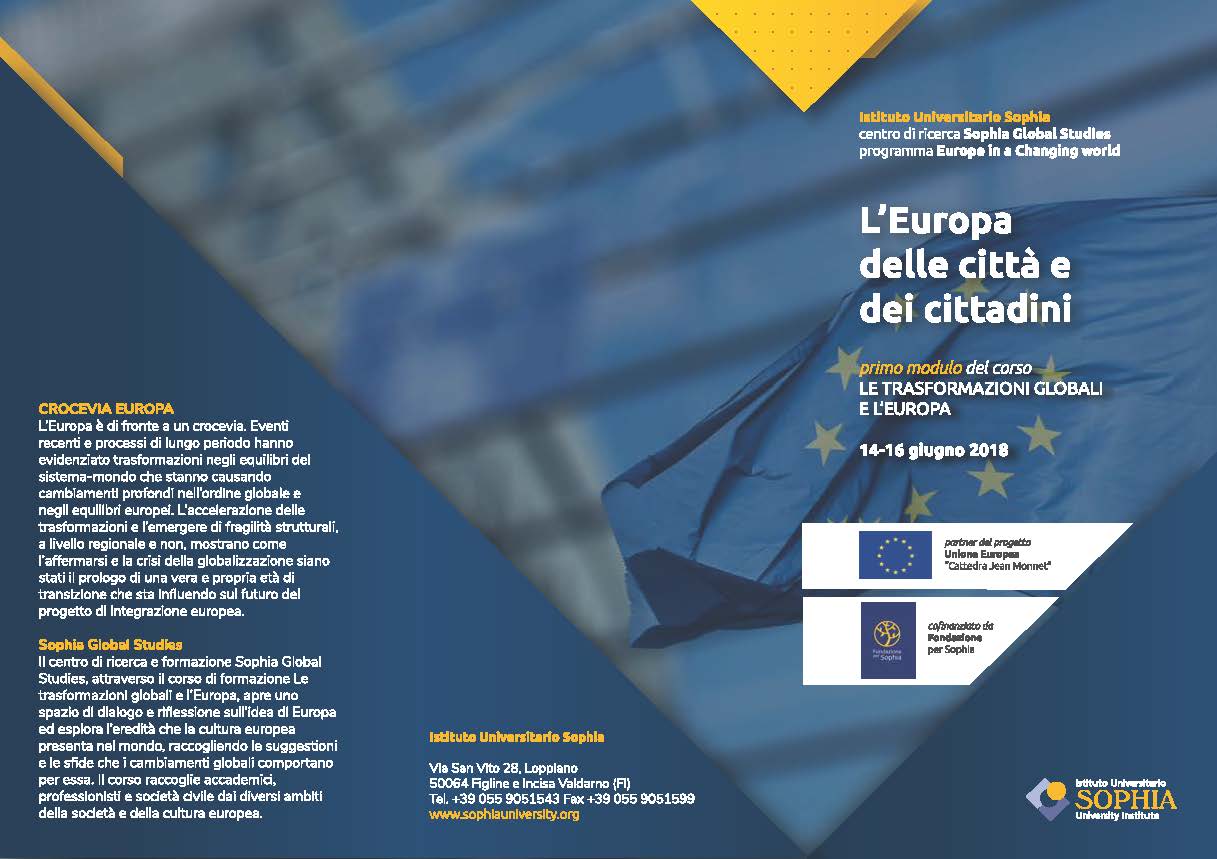 Next June, the Sophia University Institute will inaugurate the course. The 18-hour course, conducted by Léonce Bekemans, Jean Monnet Chair Ad Personam of “Globalization, Europeanisation and Human Development,” proposes the study of the role of cities as workshops of integration and citizens as the foremost actors in the process of the European project relaunch. The lessons will present the state of the integration process, reflecting on concepts such as independence, inclusion and European citizenship. Particular focus will be set on the revolt against governance systems and their local and regional dimensions. The course will be opened with an introductory paper of Romano Prodi entitled: “Europe today. What Europe in the future? The course module addresses professionals, primary and secondary school teachers, scholars, administrators and communication operators. Professors and school directors may make use of the Teacher’s Card (MIUR 170/2016). 15 scholarships are at the disposal of young people up to 30 years of age. For information and registration www.sophiauniversity.org, globalstudies@iu-sophia.org.
Next June, the Sophia University Institute will inaugurate the course. The 18-hour course, conducted by Léonce Bekemans, Jean Monnet Chair Ad Personam of “Globalization, Europeanisation and Human Development,” proposes the study of the role of cities as workshops of integration and citizens as the foremost actors in the process of the European project relaunch. The lessons will present the state of the integration process, reflecting on concepts such as independence, inclusion and European citizenship. Particular focus will be set on the revolt against governance systems and their local and regional dimensions. The course will be opened with an introductory paper of Romano Prodi entitled: “Europe today. What Europe in the future? The course module addresses professionals, primary and secondary school teachers, scholars, administrators and communication operators. Professors and school directors may make use of the Teacher’s Card (MIUR 170/2016). 15 scholarships are at the disposal of young people up to 30 years of age. For information and registration www.sophiauniversity.org, globalstudies@iu-sophia.org.
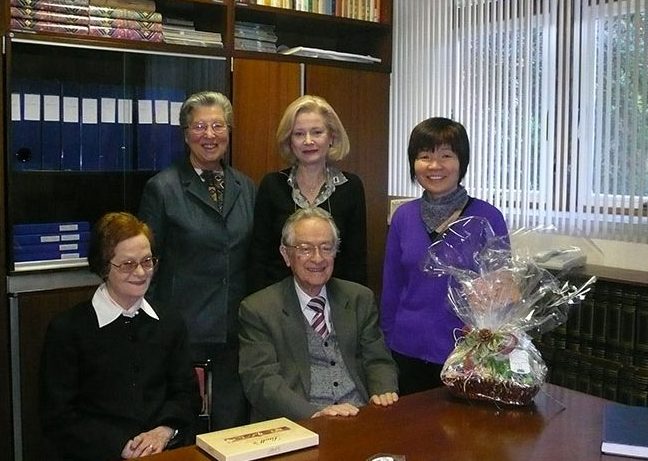
May 23, 2018 | Focolare Worldwide
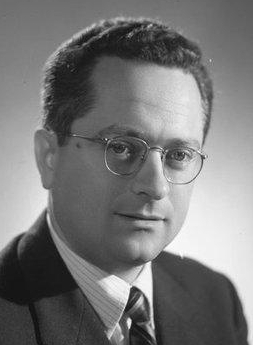 In 1956, invited by his parliamentary colleague, Igino Giordani, Tommaso Sorgi participated in the first Mariapolis held in Fiera di Primiero (Trent, Italy). He was married to Assunta, whom he tenderly loved and who bore him 4 children, but there in the Dolomites, he had gone alone only to please his friend. In fact, he thought that the event would not be so overwhelming. Instead, it was a bolt of lightning. “The encounter with the charism of unity – he recounted– renewed Christianity in me, the interior life and perhaps also the physical one, the sense of existence. Before, I saw my neighbour as a collective name, a group without bearing a single countenance, and was thus nobody. Now my neighbour is a brother or sister who exists or who passes me by.” And while Tommaso was still in the mountains, he made this resolution: “Jesus, I want to be yours, the way You want me to be, dispose of me as you wish.” Born in the province of Teramo on 12 October 1921 from a family of artisans, he graduated with top grades. He became an esteemed professor of sociology in the University of his city, a town councilor (1946-1964), a provincial councillor (1960-1964), and president of the United Institutes and Hospitals (1953-1972). His intelligence and spirit of service with which he played his public role, earned him the trust and votes of the people. In his political life – he was in Parliament from 1953 to 1972 – he stood out for his sensitivity for the weaker classes, stressed in putting in practice what he had learned in the Mariapolis. He wrote: “I am experimenting that we can “live Mary” also in the rowdy world of politics.”
In 1956, invited by his parliamentary colleague, Igino Giordani, Tommaso Sorgi participated in the first Mariapolis held in Fiera di Primiero (Trent, Italy). He was married to Assunta, whom he tenderly loved and who bore him 4 children, but there in the Dolomites, he had gone alone only to please his friend. In fact, he thought that the event would not be so overwhelming. Instead, it was a bolt of lightning. “The encounter with the charism of unity – he recounted– renewed Christianity in me, the interior life and perhaps also the physical one, the sense of existence. Before, I saw my neighbour as a collective name, a group without bearing a single countenance, and was thus nobody. Now my neighbour is a brother or sister who exists or who passes me by.” And while Tommaso was still in the mountains, he made this resolution: “Jesus, I want to be yours, the way You want me to be, dispose of me as you wish.” Born in the province of Teramo on 12 October 1921 from a family of artisans, he graduated with top grades. He became an esteemed professor of sociology in the University of his city, a town councilor (1946-1964), a provincial councillor (1960-1964), and president of the United Institutes and Hospitals (1953-1972). His intelligence and spirit of service with which he played his public role, earned him the trust and votes of the people. In his political life – he was in Parliament from 1953 to 1972 – he stood out for his sensitivity for the weaker classes, stressed in putting in practice what he had learned in the Mariapolis. He wrote: “I am experimenting that we can “live Mary” also in the rowdy world of politics.” 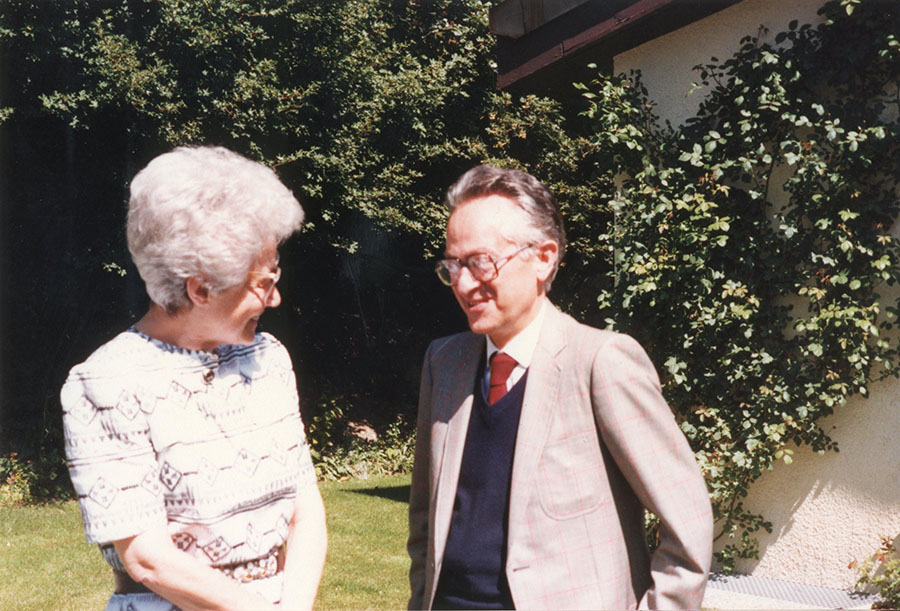 In 1985 with Assunta who also became a married focolarina, he moved to the Center of the Movement to create the “Igino Giordani Centre,” a task which gave him the chance to deepen and bring to light the multifaceted spiritual and human features of his friend and his life model, now a servant of God. Drawing inspiration from the Word Chiara Lubich had given him as a spiritual motto: “Stand up and walk” (John 5.8), he dedicated himself to the development of the New Humanity Movement, with many initiatives among which was the “Triple Pact” – moral, programmatic, participative – elaborated to favour the interaction between the elected and the voters, and the Appeal for the Unity of Peoples, presented to the UN in 1987. There is a long list of his books and essays that range from sociology to the history of Christianity, and from political theory to the figure and thought of Igino Giordani.
In 1985 with Assunta who also became a married focolarina, he moved to the Center of the Movement to create the “Igino Giordani Centre,” a task which gave him the chance to deepen and bring to light the multifaceted spiritual and human features of his friend and his life model, now a servant of God. Drawing inspiration from the Word Chiara Lubich had given him as a spiritual motto: “Stand up and walk” (John 5.8), he dedicated himself to the development of the New Humanity Movement, with many initiatives among which was the “Triple Pact” – moral, programmatic, participative – elaborated to favour the interaction between the elected and the voters, and the Appeal for the Unity of Peoples, presented to the UN in 1987. There is a long list of his books and essays that range from sociology to the history of Christianity, and from political theory to the figure and thought of Igino Giordani.  Leafing through the stages of his long life (96 years), what stands out is the constant striving towards holiness, fully lived in unity with Assunta – who went ahead to the Other Life in 2014 – and the final, vigilant waiting for “the total encounter” with God who called him to Himself last 24 April. At the funeral, among the many testimonials, his daughter, Gabriella spoke significant words on behalf of her siblings: “We thank you for the love you gave us, the efforts offered to civil society with competence, honesty and passion, your commitment to the service of the Church and humanity in the Work of Mary in a vision of the united world and for having transmitted to us a great ideal and for your coherence in a life that pushed you to recuse the privileges of the mandates and prefer giving than having. Thanks for the many gifts we received, of which we were not always aware, but which today acquire new value and depth for us, our children and grandchildren.” The Focolare Movement worldwide joins the family in raising thanks to God for the example of the figure of this great man, brilliant politician, simple focolarino donated to God, in the certainty that he has been welcomed into the immensity of His love.
Leafing through the stages of his long life (96 years), what stands out is the constant striving towards holiness, fully lived in unity with Assunta – who went ahead to the Other Life in 2014 – and the final, vigilant waiting for “the total encounter” with God who called him to Himself last 24 April. At the funeral, among the many testimonials, his daughter, Gabriella spoke significant words on behalf of her siblings: “We thank you for the love you gave us, the efforts offered to civil society with competence, honesty and passion, your commitment to the service of the Church and humanity in the Work of Mary in a vision of the united world and for having transmitted to us a great ideal and for your coherence in a life that pushed you to recuse the privileges of the mandates and prefer giving than having. Thanks for the many gifts we received, of which we were not always aware, but which today acquire new value and depth for us, our children and grandchildren.” The Focolare Movement worldwide joins the family in raising thanks to God for the example of the figure of this great man, brilliant politician, simple focolarino donated to God, in the certainty that he has been welcomed into the immensity of His love.

May 22, 2018 | Focolare Worldwide
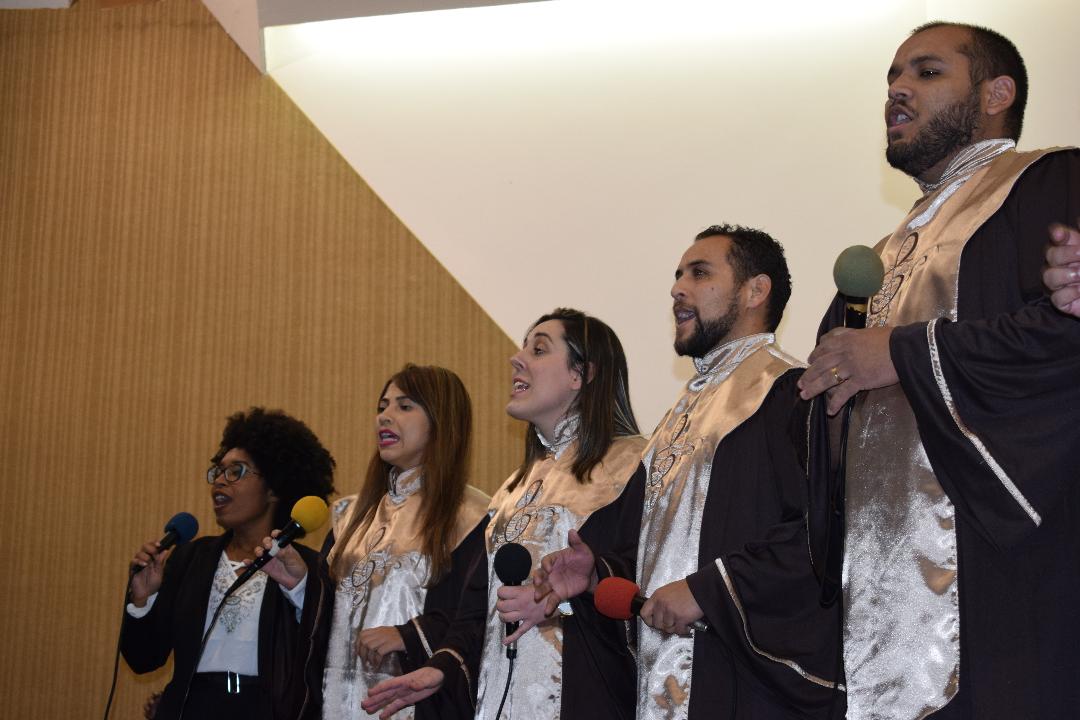 On May 16th, the 18th edition of the Noite Musical ecumenica was held at the Focolare’s Mariapolis Centre in San Leopoldo, Brazil on the occasion of the Week of Prayer for the Unity of Christians. Marina Silva, who is in charge of the Mariapolis centre, explained: “The evening of music was just one of many moments of communion among choirs from different Christian churches within the framework of the ecumenical dialogue that we work on every day.” The event gathered 400 people in a joyful and fraternal atmosphere. They came from the 7th Day Adventist churches, the Evanglical Lutheran Church, the Catholic Church, Baptist Church, JUAD, Missionaries of the Risen Christ and the Emmanuel Community of Praise and Adoration. The Integracion Choral also participated with its senior citizen singers. The theme was The hand of God unites us and liberates us” (Ex 15:1-21). Over the years, the Ecumenical Evening of Music has brought toghether 5 thousand people.
On May 16th, the 18th edition of the Noite Musical ecumenica was held at the Focolare’s Mariapolis Centre in San Leopoldo, Brazil on the occasion of the Week of Prayer for the Unity of Christians. Marina Silva, who is in charge of the Mariapolis centre, explained: “The evening of music was just one of many moments of communion among choirs from different Christian churches within the framework of the ecumenical dialogue that we work on every day.” The event gathered 400 people in a joyful and fraternal atmosphere. They came from the 7th Day Adventist churches, the Evanglical Lutheran Church, the Catholic Church, Baptist Church, JUAD, Missionaries of the Risen Christ and the Emmanuel Community of Praise and Adoration. The Integracion Choral also participated with its senior citizen singers. The theme was The hand of God unites us and liberates us” (Ex 15:1-21). Over the years, the Ecumenical Evening of Music has brought toghether 5 thousand people.
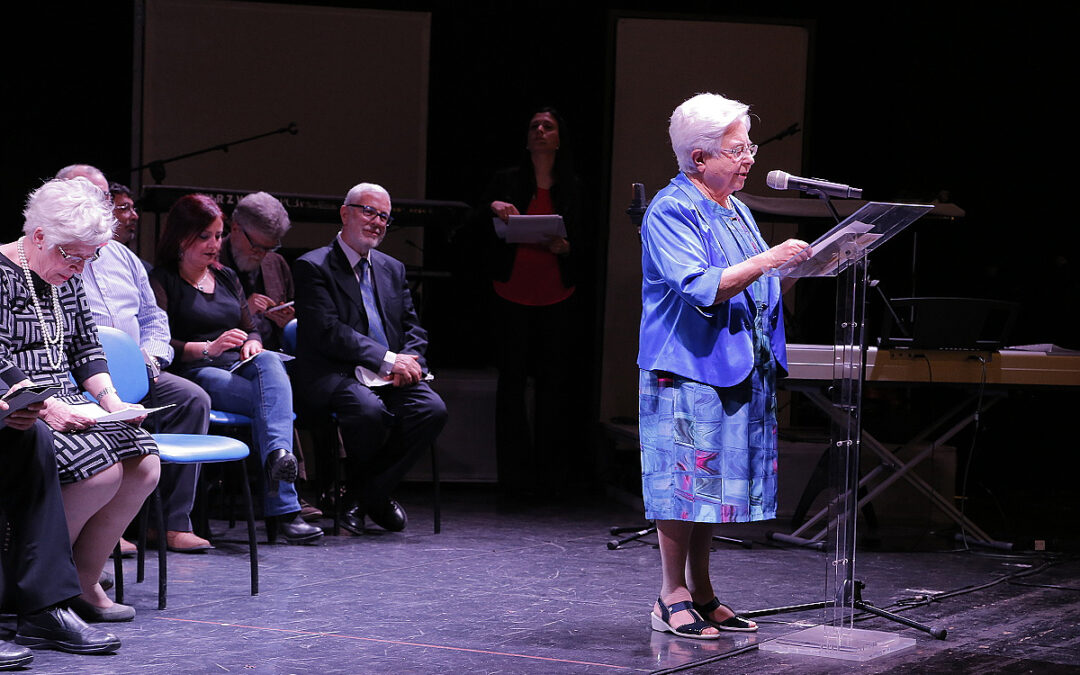
May 22, 2018 | Focolare Worldwide

Photo: Federico Patti

Photo: Federico Patti
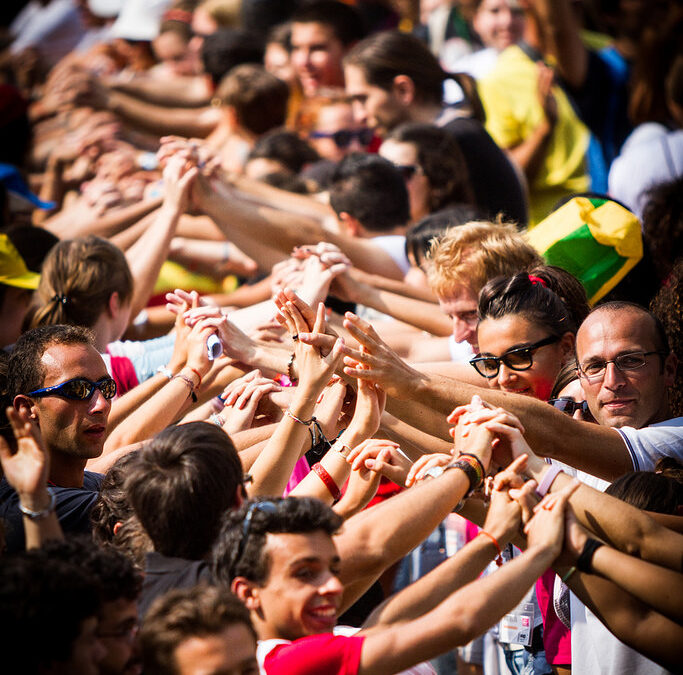
May 21, 2018 | Non categorizzato
“I went to Budapest because my aunt suggested it and I trusted her. She was special, and had always been there for me throughout my most difficult years. My problems flared up when I started high school. This new phase of my life was very demanding. I started to experience the problems of adolescence, some of my friends were going off track and I didn’t feel understood by my family. Maybe I tried to grow up too quickly. I got to know a boy who I felt was my only real friend. And even so, inside I seemed to be always on the brink of anguish. I became more and more isolated, except for the rare moments when someone would listen to my silences and, without posing many questions, simply share in something of what I was going through. By the time the school year ended, I had very few friends and was always arguing with my family. I was also losing weight. I had been trying to hide my eating disorder but it was taking hold of me more and more. It was making my life joyless, draining it of all colour, light and love. I had turned inwards and imposed a state of near total solitude on myself. This was the moment when my aunt, who is a member of the Focolare Movement, invited me to go with her to Loppiano, the Focolare town in Tuscany. I thought to myself, “three days staying who knows where, without school or studying, far from the confines of my normal life; three days in which I can just concentrate on hiding food! Why not?” Actually, it proved to be a kind of caress which reached through my defences. Everywhere we went, I was included and welcomed with respect and delicacy. Someone, after listening to me for a long time, told me about Chiara Lubich. Afterwards I realised that I had somehow stopped thinking about myself and my problems, and – most amazingly – I’d stopped thinking about food! I felt free. As I travelled back home, I ardently wished I could always live like this, like being part of one big family. But the complexities of daily life soon threatened to bring me down again. 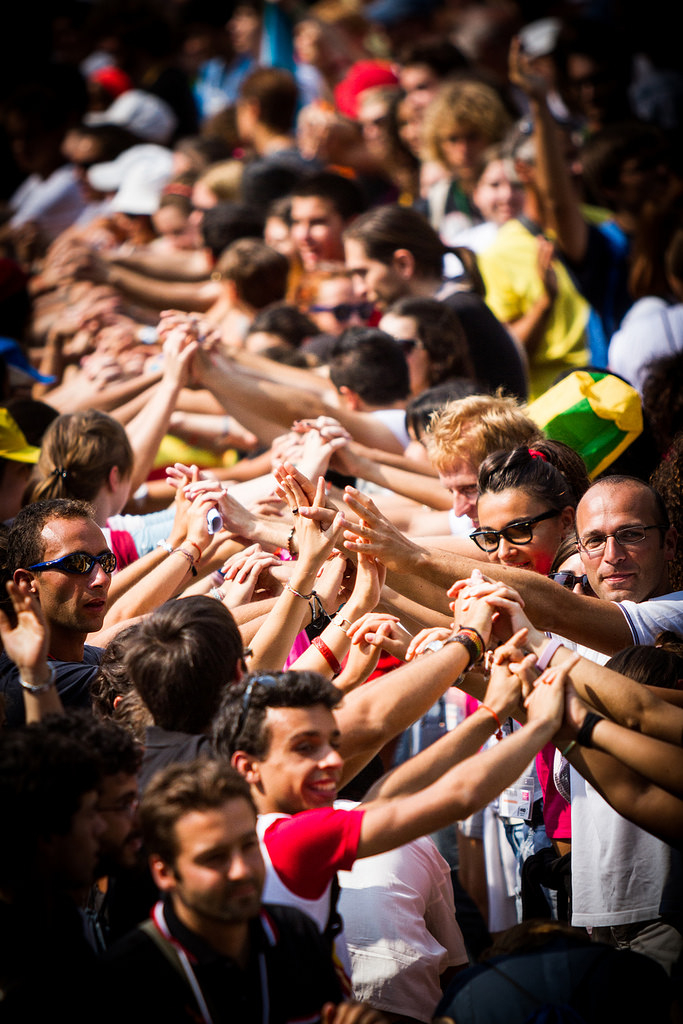 In fact, I hid behind my books while continuing to fill my head with calculations and ways to deceive those around me. I lost even more weight. My family didn’t know what to do with me. But I knew someone was praying for me. I began to go to Sunday Mass, with the excuse of taking a walk or just to get out of the house. I had always believed in God but for the first time I began to consider the possibility that Jesus could understand me and welcome me without condemning me. However, during the next two years at school, things continued to get worse. I became more and more intolerant of my family and other people. I did not respond well to the psychological therapy I was receiving. I continued to weave a web of lies and go my own way. The only time I felt any relief was during the summer holidays when I went far away from home with friends. But the summer was short and I couldn’t go on just feeling fine one month in the year. So at the end of the summer of 2012, my aunt made a new suggestion: to go to the Genfest in Budapest. I agreed and set off with five other young people from my city, including a girl from my class. It was an emotional roller-coaster for me. All those thousands of young people expressing themselves as one. It really was a bridge, not only between countries and cultures, but also a bridge between me and a new life I could embrace. I saw this sea of faces – 12,000 of them – of people ready with me to share in the beginning of a new life. I was part of the “flashmob” on the bridge over the River Danube, each of us writing a personal message on a scarf to exchange with someone from another country. I took part in the peace march. I even took part in the lunch queues. I felt part of an experience of unity, I could go anywhere because anywhere I would be at home. This time when I went back I was with my classmate and together we got in touch with the Focolare community in our home town. By now I knew that I wanted to walk the path of Jesus. It wasn’t going to be easy, my problem with food had very deep roots and the tensions within my family would not just disappear. But I felt I too was a bearer of a new light. Living the words of the Gospel one by one, I found I could begin to take control of my life. Giving of myself wholeheartedly to others, I began to discover how God loves me immensely and has a great plan on my life.”
In fact, I hid behind my books while continuing to fill my head with calculations and ways to deceive those around me. I lost even more weight. My family didn’t know what to do with me. But I knew someone was praying for me. I began to go to Sunday Mass, with the excuse of taking a walk or just to get out of the house. I had always believed in God but for the first time I began to consider the possibility that Jesus could understand me and welcome me without condemning me. However, during the next two years at school, things continued to get worse. I became more and more intolerant of my family and other people. I did not respond well to the psychological therapy I was receiving. I continued to weave a web of lies and go my own way. The only time I felt any relief was during the summer holidays when I went far away from home with friends. But the summer was short and I couldn’t go on just feeling fine one month in the year. So at the end of the summer of 2012, my aunt made a new suggestion: to go to the Genfest in Budapest. I agreed and set off with five other young people from my city, including a girl from my class. It was an emotional roller-coaster for me. All those thousands of young people expressing themselves as one. It really was a bridge, not only between countries and cultures, but also a bridge between me and a new life I could embrace. I saw this sea of faces – 12,000 of them – of people ready with me to share in the beginning of a new life. I was part of the “flashmob” on the bridge over the River Danube, each of us writing a personal message on a scarf to exchange with someone from another country. I took part in the peace march. I even took part in the lunch queues. I felt part of an experience of unity, I could go anywhere because anywhere I would be at home. This time when I went back I was with my classmate and together we got in touch with the Focolare community in our home town. By now I knew that I wanted to walk the path of Jesus. It wasn’t going to be easy, my problem with food had very deep roots and the tensions within my family would not just disappear. But I felt I too was a bearer of a new light. Living the words of the Gospel one by one, I found I could begin to take control of my life. Giving of myself wholeheartedly to others, I began to discover how God loves me immensely and has a great plan on my life.”
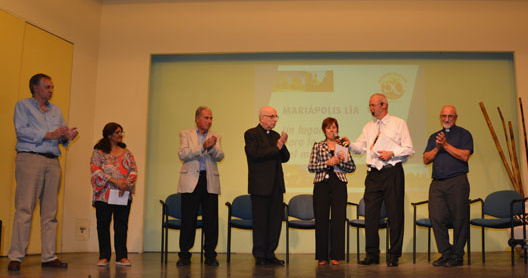
May 20, 2018 | Focolare Worldwide
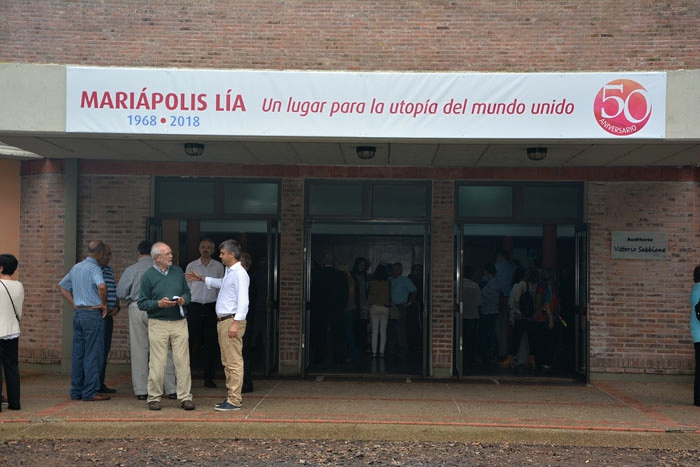 It began as a dream, just as every other Focolare town had. In 1950, Switzerland, after contemplating from a mountain above the Benedictine Abbey of Einsiedeln, Chiara Lubich had the idea that one day the spirituality of unity would produce something similar: “A small town with all the elements of a modern city: houses, churches, schools, shops, businesses and other services. A community of people from diverse backgrounds joined by Jesus’s new commandment: ‘Love one another as I have loved you.’” Her dream came true, first in Loppiano, Italy, then in another 24 small towns. Mariapolis Lia is one of them in the middle of the Argentine Pampas. Carlos Becaria, who is co-responsible for the town, was a member of the first group of pioneers: “There wasn’t anything yet. But there was a prophetic inspiration. Vittorio Sabbione, one of the first focolarinos, said to us: “You’re here because you chose God. Discomforts won’t be lacking, so you’ll have to keep Jesus on the Cross in mind. I’m not offering you anything ready-made: you have to build it all for yourselves. We stayed because we believed in that dream.”
It began as a dream, just as every other Focolare town had. In 1950, Switzerland, after contemplating from a mountain above the Benedictine Abbey of Einsiedeln, Chiara Lubich had the idea that one day the spirituality of unity would produce something similar: “A small town with all the elements of a modern city: houses, churches, schools, shops, businesses and other services. A community of people from diverse backgrounds joined by Jesus’s new commandment: ‘Love one another as I have loved you.’” Her dream came true, first in Loppiano, Italy, then in another 24 small towns. Mariapolis Lia is one of them in the middle of the Argentine Pampas. Carlos Becaria, who is co-responsible for the town, was a member of the first group of pioneers: “There wasn’t anything yet. But there was a prophetic inspiration. Vittorio Sabbione, one of the first focolarinos, said to us: “You’re here because you chose God. Discomforts won’t be lacking, so you’ll have to keep Jesus on the Cross in mind. I’m not offering you anything ready-made: you have to build it all for yourselves. We stayed because we believed in that dream.” 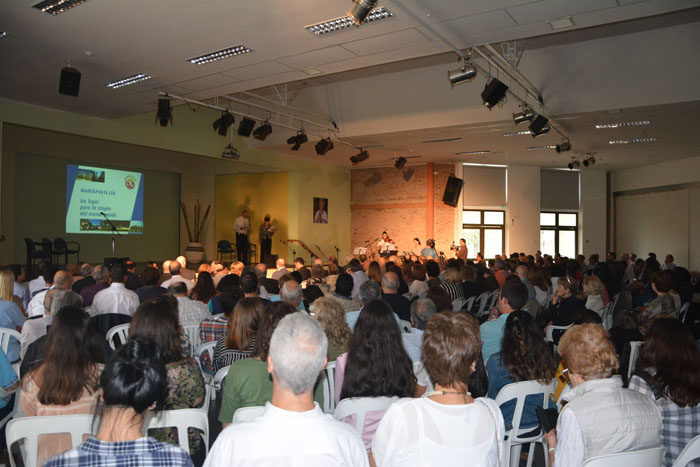 Mariapolis Lia is named after Lia Brunet (December 25, 1917 – February 5, 2005), one of the first companions of Chiara Lubich, invited by her to become a pioneer and take the charism of unity to the Latin American continent. A woman of Trent, like the foundress of the Focolare, she was labelled a revolutionary because of the radical way they lived the Gospel on a continent marked by so many social problems. Obviously, she never imagined as she gave a strong push to the Mariapolis in Argentina, that one day it would bear her name. “Lia”, just like Loppiano in Italy, which was recently visited by Pope Francis, strives to be a tangible sign of a dream that is coming true: a more fraternal world renewed by the Gospel. Currently 220 people live in Mariapolis Lia, but it welcomes hundreds of visitors throughout the year, mostly young people for long or short stays. Nearby stands Solidaridad Business Park, inspired by the Focolare’s Economy of Communion Project.
Mariapolis Lia is named after Lia Brunet (December 25, 1917 – February 5, 2005), one of the first companions of Chiara Lubich, invited by her to become a pioneer and take the charism of unity to the Latin American continent. A woman of Trent, like the foundress of the Focolare, she was labelled a revolutionary because of the radical way they lived the Gospel on a continent marked by so many social problems. Obviously, she never imagined as she gave a strong push to the Mariapolis in Argentina, that one day it would bear her name. “Lia”, just like Loppiano in Italy, which was recently visited by Pope Francis, strives to be a tangible sign of a dream that is coming true: a more fraternal world renewed by the Gospel. Currently 220 people live in Mariapolis Lia, but it welcomes hundreds of visitors throughout the year, mostly young people for long or short stays. Nearby stands Solidaridad Business Park, inspired by the Focolare’s Economy of Communion Project. 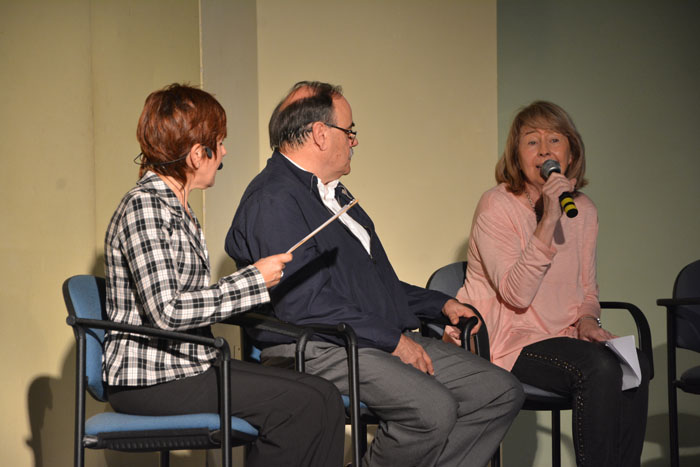 More than 250 people took part in the celebrations at the end of April, which will continue during the 50th anniversary year of the Mariapolis’s founding. They will be attended by Church leaders, representatives from the Movement, Christian Churches, Jewish faithful and people with no religious affiliation. “We got there at night,” recalls Marta Yofre, one of the first young women to arrive on at the threshold of the Mariapolis. I was feeling a sense of powerlessness, but also one certainty: Our Lady would be the one to build it.” Nieves Tapia, founder of the Latin American Centre for Learning and Solidarity Service, attended the training school for young people in the 1980s: “Here I learned to love the other country as my own and to enlarge my heart to all of Latin America.” “Without realizing it, I was given the gift to experience as something normal, what was actually totally revolutionary: love for neighbour.” For Arturo Claria, a psychologist, UNESCO Master in Culture of Peace, what he experienced in the Mariapolis twenty years ago “is a mark that I will never be able to erase, a living demonstration that love transcends life.”
More than 250 people took part in the celebrations at the end of April, which will continue during the 50th anniversary year of the Mariapolis’s founding. They will be attended by Church leaders, representatives from the Movement, Christian Churches, Jewish faithful and people with no religious affiliation. “We got there at night,” recalls Marta Yofre, one of the first young women to arrive on at the threshold of the Mariapolis. I was feeling a sense of powerlessness, but also one certainty: Our Lady would be the one to build it.” Nieves Tapia, founder of the Latin American Centre for Learning and Solidarity Service, attended the training school for young people in the 1980s: “Here I learned to love the other country as my own and to enlarge my heart to all of Latin America.” “Without realizing it, I was given the gift to experience as something normal, what was actually totally revolutionary: love for neighbour.” For Arturo Claria, a psychologist, UNESCO Master in Culture of Peace, what he experienced in the Mariapolis twenty years ago “is a mark that I will never be able to erase, a living demonstration that love transcends life.”  The Bishop of Mercedes-Lujan, Augustin Radrizzani: “It’s moving to realize what significance it has had for our country and for the world. It unites universal peace and brotherly love, illumined by the grace of this ideal.” Eduardo Leibobich from the Hebrew Organization for Inter-Confessional Dialogue, recalled the numerous “Peace Days that were held by the Mariapolis. Methodist pastor Fernando Suarez from the Ecumenical Movement of the Human Rights of People With Different Convictions: “I extend an invitation to join forces. It’s too beautiful the ideal of a free and equal human race, made brother and sister by respect and by mutual love.” Gustavo Clariá
The Bishop of Mercedes-Lujan, Augustin Radrizzani: “It’s moving to realize what significance it has had for our country and for the world. It unites universal peace and brotherly love, illumined by the grace of this ideal.” Eduardo Leibobich from the Hebrew Organization for Inter-Confessional Dialogue, recalled the numerous “Peace Days that were held by the Mariapolis. Methodist pastor Fernando Suarez from the Ecumenical Movement of the Human Rights of People With Different Convictions: “I extend an invitation to join forces. It’s too beautiful the ideal of a free and equal human race, made brother and sister by respect and by mutual love.” Gustavo Clariá
May 19, 2018 | Non categorizzato
The Christian celebration of the outpouring of the Holy Spirit upon Mary and the disciples of Jesus is celebrated at Pentecost, that is, on the fiftieth day of Easter. We read in the Acts of the Apostles: “When the day of Pentecost came, they were all together in one place. Suddenly a sound like the blowing of a violent wind came from heaven and filled the whole house where they were sitting. They saw what seemed to be tongues of fire that separated and came to rest on each of them. All of them were filled with the Holy Spirit and began to speak in other tongues as the Spirit enabled them.” (Acts 2:1-4). Chiara Lubich wrote when referring to the charism of unity: “The Holy Spirit is the gift that Jesus gave to us so that we might be one as He and the Father are one. Of course, the Holy Spirit was in us to begin with, since we were Christians; but here there was a new illumination, a new manifestation of the Spirit among us, which made us participants and actors in a new Pentecost, along with those ecclesial Movements renew the face of the Church.”
May 18, 2018 | Non categorizzato
“When Jesus was no longer physically present on earth, Mary lived with the Church, the continuation of Jesus. To outward appearances, she would have seemed to be the mother of John, representing all disciples, rather than the mother of Jesus who was no longer to be seen. So Mary was found in the heart of the Church, in the cenacle, the “upper room”. She had withdrawn there from Mount Olivet with the Apostles, disciples and pious women after the ascension. The Apostles “were constantly devoting themselves to prayer, together with certain women, including Mary the mother of Jesus” (Acts 1:14). The first Church – according to Saint Luke – formed “one heart and one soul” and “none of them was in need”, all gathered around the one table. How was such communion possible, making them all one? It was because Mary was there, hence the Holy Spirit was there. So the ideal of the Son was fulfilled and the Father reigned there. His kingdom had come, with the presence of “our Father who art in heaven” and “our daily bread on earth”. The Magnificat was being expressed again and diakonia – service, was being lived out. The function of Mary – a function of love, and therefore of the Holy Spirit – was and is that of unifying, putting heavenly and earthly goods in common. In this way the mystical body of Christ is raised to life; generating Jesus for the world; and in him she unifies souls together, setting them in wisdom. She is the model for mothers of Christian homes, with a heart that unifies, a mind that enlivens […], igniting the atmosphere of warmth (of “focolare” = fire place), where all feel as one, cells of the one body. Aware of this mission, which is to participate in the work of Christ, woman – associated more than any other creature with the work of creation – finds it easier to turn to the Creator. She can confide more tenderly with Mary. Following her example she can endow her intimate home life with both virginal purity and maternal warmth. In this way she can come to resemble the Virgin Mother. In the cenacle, Mary represented Jesus and hence bore the highest dignity, spiritually sustaining the juridical pre-eminence of Peter. But what came to light in her way of being was a soul who completely identified herself with the Church, making it her own, blessed fruit of her womb, hidden, losing herself within it, as a true ancilla Domini, handmaid of the Lord. In fact, all the faithful, laity included, must live the Church, in the Church, with the Church, always with this same sentiment. In this way the Church will no longer seem to be something extraneous, but will be their own, their life, the centre of their sanctification. Neither words nor special attire are needed. It is sanctity that needs to be lived within the Church. And the first fruit will be its unity. Mary inspires “many different forms of apostolate by the laity. … There are souls yearning to live the doctrine of Jesus more openly and more completely. There are souls burning with the desire to make him known to others, particularly to their work colleagues. There are those desiring to re-establish justice and charity within social institutions and to introduce into the temporal order of society a reflection of the perfect harmony that unites the children of God. To all these souls, Mary obtains the grace of the apostolate. She places on their lips words which can convince without wounding …” (Pope Pius XII). Mary is a social reformer, a credible model of apostolate, a symbol of charity, font of justice. No small number of lay movements look to her in order to contribute towards building unity, that ideal testament of Jesus, in a “Mary-like” manner, preparing for the city of God on earth. Mary, in fact, has been viewed by the saints as the “city of God”. Igino Giordani, Maria modello perfetto, Città Nuova, Roma, 1967 2012, pp.150-152.

 Next June, the Sophia University Institute will inaugurate the first module of the course “Europe and the global transformations.” The 18-hour course, conducted by Léonce Bekemans, Jean Monnet Chair Ad Personam of “Globalization, Europeanisation and Human Development,” proposes the study of the role of cities as workshops of integration and citizens as the foremost actors in the process of the European project relaunch. The lessons will present the state of the integration process, reflecting on concepts such as independence, inclusion and European citizenship. Particular focus will be set on the revolt against governance systems and their local and regional dimensions. The course will be opened with an introductory paper of Romano Prodi entitled: “Europe today. What Europe in the future? The course module addresses professionals, primary and secondary school teachers, scholars, administrators and communication operators. Professors and school directors may make use of the Teacher’s Card (MIUR 170/2016). 15 scholarships are at the disposal of young people up to 30 years of age. For information and registration www.sophiauniversity.org, globalstudies@iu-sophia.org.
Next June, the Sophia University Institute will inaugurate the first module of the course “Europe and the global transformations.” The 18-hour course, conducted by Léonce Bekemans, Jean Monnet Chair Ad Personam of “Globalization, Europeanisation and Human Development,” proposes the study of the role of cities as workshops of integration and citizens as the foremost actors in the process of the European project relaunch. The lessons will present the state of the integration process, reflecting on concepts such as independence, inclusion and European citizenship. Particular focus will be set on the revolt against governance systems and their local and regional dimensions. The course will be opened with an introductory paper of Romano Prodi entitled: “Europe today. What Europe in the future? The course module addresses professionals, primary and secondary school teachers, scholars, administrators and communication operators. Professors and school directors may make use of the Teacher’s Card (MIUR 170/2016). 15 scholarships are at the disposal of young people up to 30 years of age. For information and registration www.sophiauniversity.org, globalstudies@iu-sophia.org.



 In 1956, invited by his parliamentary colleague,
In 1956, invited by his parliamentary colleague, 

 On May 16th, the 18th edition of the Noite Musical ecumenica was held at the Focolare’s Mariapolis Centre in San Leopoldo, Brazil on the occasion of the Week of Prayer for the Unity of Christians. Marina Silva, who is in charge of the Mariapolis centre, explained: “The evening of music was just one of many moments of communion among choirs from different Christian churches within the framework of the
On May 16th, the 18th edition of the Noite Musical ecumenica was held at the Focolare’s Mariapolis Centre in San Leopoldo, Brazil on the occasion of the Week of Prayer for the Unity of Christians. Marina Silva, who is in charge of the Mariapolis centre, explained: “The evening of music was just one of many moments of communion among choirs from different Christian churches within the framework of the 





 It began as a dream, just as every other Focolare town had. In 1950, Switzerland, after contemplating from a mountain above the Benedictine Abbey of Einsiedeln,
It began as a dream, just as every other Focolare town had. In 1950, Switzerland, after contemplating from a mountain above the Benedictine Abbey of Einsiedeln, 
 More than 250 people took part in the celebrations at the end of April, which will continue during the 50th anniversary year of the Mariapolis’s founding. They will be attended by Church leaders, representatives from the Movement, Christian Churches, Jewish faithful and people with no religious affiliation. “We got there at night,” recalls Marta Yofre, one of the first young women to arrive on at the threshold of the Mariapolis. I was feeling a sense of powerlessness, but also one certainty: Our Lady would be the one to build it.” Nieves Tapia, founder of the Latin American Centre for Learning and Solidarity Service, attended the training school for young people in the 1980s: “Here I learned to love the other country as my own and to enlarge my heart to all of Latin America.” “Without realizing it, I was given the gift to experience as something normal, what was actually totally revolutionary: love for neighbour.” For Arturo Claria, a psychologist, UNESCO Master in Culture of Peace, what he experienced in the Mariapolis twenty years ago “is a mark that I will never be able to erase, a living demonstration that love transcends life.”
More than 250 people took part in the celebrations at the end of April, which will continue during the 50th anniversary year of the Mariapolis’s founding. They will be attended by Church leaders, representatives from the Movement, Christian Churches, Jewish faithful and people with no religious affiliation. “We got there at night,” recalls Marta Yofre, one of the first young women to arrive on at the threshold of the Mariapolis. I was feeling a sense of powerlessness, but also one certainty: Our Lady would be the one to build it.” Nieves Tapia, founder of the Latin American Centre for Learning and Solidarity Service, attended the training school for young people in the 1980s: “Here I learned to love the other country as my own and to enlarge my heart to all of Latin America.” “Without realizing it, I was given the gift to experience as something normal, what was actually totally revolutionary: love for neighbour.” For Arturo Claria, a psychologist, UNESCO Master in Culture of Peace, what he experienced in the Mariapolis twenty years ago “is a mark that I will never be able to erase, a living demonstration that love transcends life.”